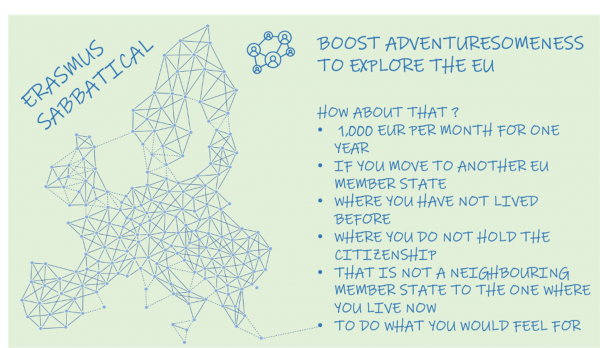
KREMER April 2021
ERASMUS Sabbatical
A proposal on how to bring Europe back to its citizens

by Kai Böhme
Europe, the European idea is in trouble. The COVID-19 pandemic is a crisis which has cast new shadows over the EU. It is a crisis which hardly is been used as an opportunity to step back, reflect and change direction. Closed borders, blame games among member states, and between member states and the EU Commission put the achievement on a joint budget for the NextGenerationEU into the shadow.
On top of this, the most likely outcome of the pandemic will be increasing disparities. People with low income and low education levels will suffer more and longer from the crises than high income people and high education levels. Just think about who is able to work comfortably from a home office and to do so in a spacious environment. Furthermore, in many cases the places which suffered heavily from the 2008 financial crises are expected to suffer more and longer from the pandemic. Take, for example, Mediterranean tourism regions. In many of them the tourism sector is expected to reach pre-COVID levels only in 4-5 years from now.
Does this sound like an EU where all policies at all levels are underpinned by a strong cohesion spirit? Economic, social and territorial cohesion are the glue which keeps the EU together and ensures that all feel included with no-one left behind. Can it be, that this spirit has been lost? Has it been lost some while ago and the pandemic has just made it abundantly clear?
What can Europe do to change this? What can Europe do to turn the boat around? Throwing more money at a lost cause by doing more of the same (NextGenerationEU) or a half-hearted attempt at a dialogue on the future with already converted citizens (Future of Europe) will not do the trick.
Probably Europe needs to collect and embrace many ideas and call for bolder ideas, more along the lines of Rob Hopinks (What if things turned out OK?), Mariana Mazzucato (moonshot missions) or Geoff Mulgan (quicken societal imagination). Could Europe stimulate people’s adventuresomeness to explore other parts of the EU not just for holidays and student exchanges?
Throwing a tiny stone in the discussion, here comes a proposal for an ERASMUS Sabbatical to which any EU citizen can apply. Offering any EU-citizen older than 25 to spend one year paid in another EU country. The fine-tuning can come later, but in short,
- 1,000 EUR per month for one year
- if you move to another EU member state
- where you have not lived before
- where you do not hold the citizenship
- that is not a neighbouring member state to the one where you live now
- to do what you would feel for, e.g.
- learn and train for new skills (languages, hobbies, professional, …);
- do something you always wanted to do (meet & greet new people, do voluntary work, …); or
- work and find an interesting job in the new country.
Such a simple scheme may help people to discover the Europe they are part of. It may bring the European idea and the beauty of European diversity closer to them. It may also help people in places which are currently facing contracting labour markets to do something else for one year, without the pressure of immediately finding a new job and the stigma of being unemployed. Furthermore, it might help these places to ease the pressure on the labour market without risking a brain drain. Ideally people will return after 12 months, richer in experience. Such a policy might also help some less prosperous areas, where housing prices and costs of living are lower, e.g. rural areas or shrinking cities. This is because people might opt to spend their ERASMUS Sabbatical in places, where 1,000 EUR a month lasts longer than in Paris city centre, or where climate conditions are favourable.
Considering the amounts envisaged to be spent on recovery, such a policy would probably be comparatively inexpensive. Still, it might stimulate people’s adventuresomeness to explore other parts of the EU and bring Europeans closer to each other. This would also bring the European idea and the EU closer to the citizens.